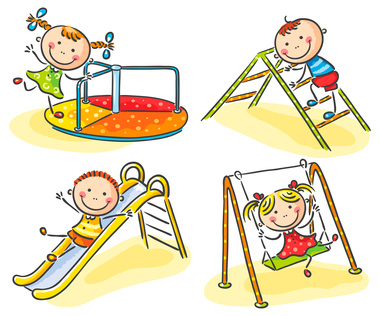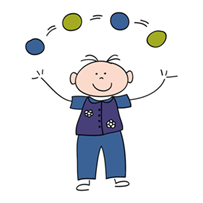Theories of learning
Timeline of the learning theorist and their philosophy of learning through play.
| Theorist | Learning Theory | Application of idealogy today |
|---|---|---|
| Jean-Jacque Rousseau (1712 - 1778) | French philosopher was the pioneer of 'play'. He believed that play was at the heart of learning for children under the age of 12 year and advocated
that children should be allowed to explore and discover the world without adult involvement.
|
Shaped current thinking that children should learn through a curriculum based on play. Influenced pioneer of play who followed him. |
| Friedrich Froebel (1782 - 1852) |
Founder of the first kindergarten in Germany for children aged 3 to 7 years.He placed
emphasis on outdoor play where children could run around,
explore the surroundings and play in fresh air with natural materials.
He also stressed the importance of symbolic play and imaginative play. He introduced 'block play' using wooden blocks to learn mathematical concepts through play. |
Curriculums designed to focus on the needs of children. Child-centred play is at the heart of learning. Block play used to develop mathematical concepts. Nursery rhymes are sang to encourage language development. Out door play is part of every nursery that encourages learning. Children centres and nurseries offer programmes that integrate play and education. |
|
Maria Montessori (1870-1952) |
Maria Montessori was born in Italy and studied in Rome and graduated as a physician, and later
pursued a career in early years learning. Believed children were 'active learners' who enjoyed hands-on activities. She focused on structured play and guidance from adults to help children reach their potential. Emphasis was on learning that gives children independence and dignity, with this in mind, she encouraged children to learn skills by doing real life activities such as sweeping and serving meals; child-size equipment was used to facilitate practical learning. Maria Montessori also believed children were receptive at particular stages of their development and hence adults guidance was important during this time. Maria Montessori valued structured play rather than free play. Especially designed materials are used to promote learning - MM believed children will interact with the equipment when they are ready to learn at a correct developmental stage. Sensory learning experiences in early years is important as children have absorbent minds. Maria Montessori felt must have opportunity to develop morally and spritually because a child's soul was like a mirror that could be affected by any influence. |
Montesories were emerging all over which took on a holistic approach to development. These nurseries considered child's age when planning activities,
and focused on interaction of the child in their environment. Montesories encouraged children to organise their own activities and absorb information from their environment. |
| Rudolph Steiner (1861-1925) | Community education is at the heart of Rudolph Steiner's philosophy of learning. He takes a holistic approach in education in that children's
physical well-being and emotional well-being are equally important as healthy diet and excercise and a safe environment that nurtures
a bonding between child and adult. Rudolph Steiner believed that learning should be child-centred and their personality and interest should be considered
when planning activities and programmes.
Children with special needs included in the play activities and children encouraged to show empathy to each other. Heart, soul and head - 3 parts of the children's learning involved the heart, soul and head throughout the education years. |
Children with special needs are integrated into mainstream schools where
possible. Inclusive practice is integral to Educational and childcare setting - childrens' special needs are considered when planning activities. Circle time is widely used as a means of developing children's self-esteem and communication skills. |
| Margaret McMillan (1860 - 1931) | Born in New York, but educated in Scotland. She felt that a child could develop into a whole person by learning through play.
She focused on children acquiring manual dexterity through exercises and placed emphasis on the importance of social and emotional
development. Emphasis was also on healthy diet to promote learning; she saw a correlation between children being deprived of healthy eating and poor learning. She pioneered healthy school meals and medical services for children. Margaret McMillan pioneered nursery schools with outdoor playground and worked in partnership with parents, offering classes to help them develop the skills needed to learn with their children. Also placed importance of training people working with children. In 1914 the first open-air nursery school was opened in Peckham, London by Margaret McMillan. She pioneered healthy school meals and medical services |
Curriculum based on play are child-centred. Nurseries staff work cooperatively in partnership with parents and recognise them as educators of their children. Nurseries and educational establishment regularly provide professional development training to adults working with children. |
| Susan Isaac (1885 - 1948) | A psycholanalyst and expertise in early years. Influenced by Froebel she believed that a child's emotional life was revealed
through the symbols and themes they explored in imaginary play. Isaac therefore felt that play should be used to explore a child feelings and that through play children would come to understand the world around them. She felt that children should have their space and freedom to move when playing and discouraged desk based learning. A play base education was her vision until the age of 7 years. Her research showed that children regressed if started school at 5 years. Many prof in early years share this view and are concerned with current trend of children entering into compulsory school in the year of their 5th birthday. |
Isaac has influenced current play provison today: empahsis on importance of working woth parents. the use of imaginary play as a way to explore feelings. Freedom to move around the classroom. The current debate on whether children should have to enter school as early as 4 years of age. |
| Lady Allen of Hurtwood ( 1897 - 1976) | An English landscape architect and campaigner for children. A key figure in development of play work in this
country which is primarlily aimed at children over 8 years of age. She is also founder president of the World Organisation for Early Childhood. She campaigned for the first Children Act of 1948 and opened the first English junk playground in Camberwell, London. After visiting a sterile playground in US, she said that a a successful playgound is one in which childrren can move things and make a new object in their own way. She went on to create maginative playground over old bombsites. and founded the National Adventure Playgrounds Association now know as Kidsactive. In 1970 she opened the first adventure playground for disabled children. |
Today lady Allen campaign for exciting spaces for children and young people has influenced: the child-centred open
spaces widely available for young people today. The recognition of the importance of play spaces for chilldren who may not have a garden of their own. There are many adventure playgounds that exist today for children and young peope who are disabled. |
| Jean Piaget (1896 - 1980) | His a pproach is fundamental to a play-based curriculum. Piaget believed children were active learners who construct knowledge through exploration.
According to Piaget children make sense of the world by forming 'schemas' which are mental representation of an object situation or experience Piaget believed through schemas, children develop and adapt their experiences. Piaget also believed that Children's cognition (process of thinking, organising information and learning abstract concepts) development passes through four stages linked to their biological development. The four stages of development are: sensory motor, pre-operational, concrete operations and formal operations. |
Piaget's theories have influenced the Education practice in England today. Educators use this knowledge from Piaget to shape their curriculums and activities in order to produce an environment where children can learn through experience. |









